|
A twinkle of hope lit up the eyes of the Prince of Suwat. For a moment he relaxed his inimical posture. "So Mr. Holmes you have already solved the riddle?" he asked eagerly.
"No, you will do it for me. And if not for me, then for yourself."
Immediately his face darkened again. "This makes no sense. Puzzles and chattering are for the weak and old. I have no head for this."
"Yet you would be surprised how much you are capable of if you applied yourself. You know much more than we do about this affair. Please read the poem attentively."
Grudgingly the Prince picked up the paper and started to read.
"I don't know how to start, I keep turning in circles.
Is it better to die on a faraway coast at the hand of He who is our Host,
or to be chased from town to town, never ever settling down?
The whole world was in retreat, to London from Warsaw.
But none so much as me, for flight was my last straw.
Down I came to the final battle, outside the city gates.
The guards who didn't let me in, they shared the same fates.
Death is upon me, but I'm at peace.
From the burden I carried I found release,
In the city I didn't enter, there are the keys.
I don't know how to start, I keep turning in circles." |
"Well?" I asked him when he finished.
The Prince stroke his small moustache with the tip of his index finger. "No, nothing," he said at last. "It's a mystery from the first to the last. You explain it to me."
"What about the Host mentioned in the second line?" I volunteered. "We know that the Sultan was sojourning in Venice. The Host must thus be either the Duke of Venice or the King of Italy."
"Simply brilliant, Watson," said Holmes. "Dying on a faraway coast could mean that a unit has landed in Italy from the sea before being destroyed. One of the Turkish armies, perhaps?"
The Prince shook his head contemptuously. "You don't know my father or the Grand Vizier, his closest friend and advisor. The Grand Vizier had the task of writing my father's official correspondence, so when he uses "our" he means the Sultan. To my father the Doge or even the King of Italy were his peers and he would never use a capital letter when addressing them. This he would reserve only for Allah and the Sultan of the Ottoman Empire, our overlord."
"I stand corrected," Holmes said without reserve. "The action goes the opposite way. The faraway coast is not outside of, but in Turkey. On that note, would you agree that the Russian Black Sea coast is too close to be called faraway?"
"Considering that a sizeable part of our brothers still consider the Crimea part of the Empire and the Black Sea an inner lake, I must agree."
"Then Russia can be excluded. Likewise Austria could have its Budapest army convoyed from Rumania to reach Turkey and get dislodged there. But again this is a relatively short "lake" trip. And for the Austrian fleet to reach Constantinople or Smyrna four moves are required, leaving no time for dislodgement. This then only leaves Italy. But not through convoy."
I frowned deeply before remarking: "You mean that Venice took the land route to Constantinople? That's four moves as well. While a convoy through Ionian and Aegean can be accomplished in the Fall, no, Spring of 1902." I corrected myself quickly, realizing that no fleet could be in the Aegean Sea at the start of Fall 1901, and so no convoy could happen yet other than to Greece.
"Correct," Holmes agreed. "But if the convoy is in Spring 1902, how will you get rid of not just the Italian army, but also two fleets of different nationality? You can't. Which leads us to the logical conclusion that it's the Italian fleet itself that is moving to Turkey and getting dislodged from one of the Turkish home centers in the Fall of 1902."
The Prince looked at us as if we came from another planet. "I won't pretend understanding any of this, so if you could restrict yourself to your conclusions and minimize the banter…"
I almost exploded: "The banter, Sir, is an integral part of the solution!"
But Holmes was less concerned. "We can limit the details, Your Highness. Watson, you had already observed that the Vizier started in Venice. Assuming that this is the "I" in the poem, we know that this unit is on the run, and thus moving to different locations on every turn. In the later turns this can be through retreat, but in the first turn this is not possible, and so it must move itself. Where would it move?"
I considered this for a moment. "In order to dislodge on the next turn the Venetian army must be surrounded by two enemy units. That limits us to … Piedmont, Tyrolia and Trieste."
The Prince gave a sudden start. "Did you say Trieste? That's the city where my mother was born. It's like my second home. I spent many a holiday at my grandparents' estate in the company of my mother and occasionally the Vizier, when matters of State were less pressing."
"'The Strand on Sunday' insinuated that the Vizier even had a fling with your mother's older sister," I said, citing my wife's favorite magazine.
The Prince shrugged. "They were pretty close. But my aunt is a staunch Catholic, who would never consider converting to the Muslim faith."
"Is your mother or her sister in Trieste now?" Holmes enquired.
"As a matter of fact, they both are. My father had many wives, so it's not uncommon for them to live with their parents for some time when the stresses of court life become too much."
"Trieste is only 70 miles from Venice along the Adriatic coast. The Vizier could easily get there by boat or by train or carriage. The terrain is familiar to him, so he could sneak by without getting noticed. Did you hear from your mother if she had met him?"
"I received a letter from her the other day, mostly concerned with the clothes I would wear on coronation day. She did express concern about the welfare of the Vizier, and that she had a visit from the international police. But she told them as she told me that she knows nothing about his whereabouts. She led them around the house until they were convinced that he was not hiding there."
"I imagine they are still keeping an eye on the house. And what about her sister?"
"She was distraught at first, but she recovered quickly. The next day she was already busying herself around the house, even cooking a meal, something she hardly ever does. But that period has passed, and she has gone back to her usual routine of praying and fasting, albeit with more vigor now."
"A remarkable lady," said Holmes. "Let us put forward as a hypothesis that after his disappearance the Vizier went to Trieste first, met the sister, made her hide him from sight for a few days until he was able to arrange his next hide-out. He then moved on, and she turned to praying for his safe return."
"That's why she was in the kitchen. She was cooking his meals. We're hot on his trail, Holmes!" I exclaimed. "And this board will tell us his next stop."
"How ridiculous," protested the Prince. "Why would he limit himself to a few spots on a gameboard, when he has the police of several nations searching for him? He would do better hiding in some little village deep in the countryside."
"Country people can be very suspicious of strangers. There's no better place than the big city to stay incognito. But let us not question his motives too deeply. Is the Vizier fond of the Opera?"
"Absolutely, he loves it. He would organize a visit to the Opera or the Concert Hall wherever my father travelled, and occasionally sang complete arias when he thought himself to be alone. He has a delicately pitched voice. But why do you ask?"
"Elementary. Notice the dramatic structure of the poem; the tragic opening, the hero's flight, the climactic fight, and the ultimate redemption. It's not unlike a piece of Mozart or Haydn."
"The City of Music, Vienna!" I said excitedly. "But how do we know he went there in Fall?"
"Because for the last battle he came down… Down from the mountains, that is. To be precise, the Tyrolian Alps. He therefore went to Tyrolia in the Spring of 1902, and thus moved either to Venice or Vienna in the Fall of 1901. For the real Vizier to go back to Venice constitutes a considerable risk, as the police is guarding every entrance to the city. Vienna therefore is the more likely destination."
"But which city did he finally go to? And is he in any mortal danger, as the poem suggests?" asked the Prince with a hint of anxiety in his voice. "When I look at the board, I can see four cities bordering Tyrolia: Venice, Trieste, Vienna and Munich."
"Tyrolia has indeed the distinguishing feature of bordering the single most number of home centers of any space on the board. Where he went or how he fares, I cannot tell yet," said my friend. "But let us put our theories to the test and see how far we get. Just the other day Dr. Watson here has impressed me with his skills in solving the Portage Convoy riddle. I pray him to give us another demonstration."
"If you think I can be of service," I murmured, barely able to hide my pride at hearing such praise from the Master himself.
"Portage Convoy?" asked the Prince in wonder. "The words sound familiar, but I cannot place them."
"Of course you do," I told him. "Portage Convoy is a variation coined and popularized by the people of the Port of Suwat, allowing the convoy of fleets by armies."
"Is Diplomacy that popular then?" he said shocked, as if he suddenly came to realize how much he still had to learn about what lived among his people.

|
With the poem now decrypted here's your last chance to solve the puzzle. Try to see how far you get before Dr. Watson and company get to the grit of it.
|
...and when you're ready to continue with the narrative,
click here...
Holmes and the Prince took a seat at the table, while I put the pieces back in their starting position. Standing I would have a better reach to move around the pieces.
"Just like your father the Sultan, I will take Holmes' London variation of the original False Start problem as our starting point."
I moved all pieces according to the first season of said variation, which only deferred with the original solution in that fleet London went to Wales instead of army Liverpool.
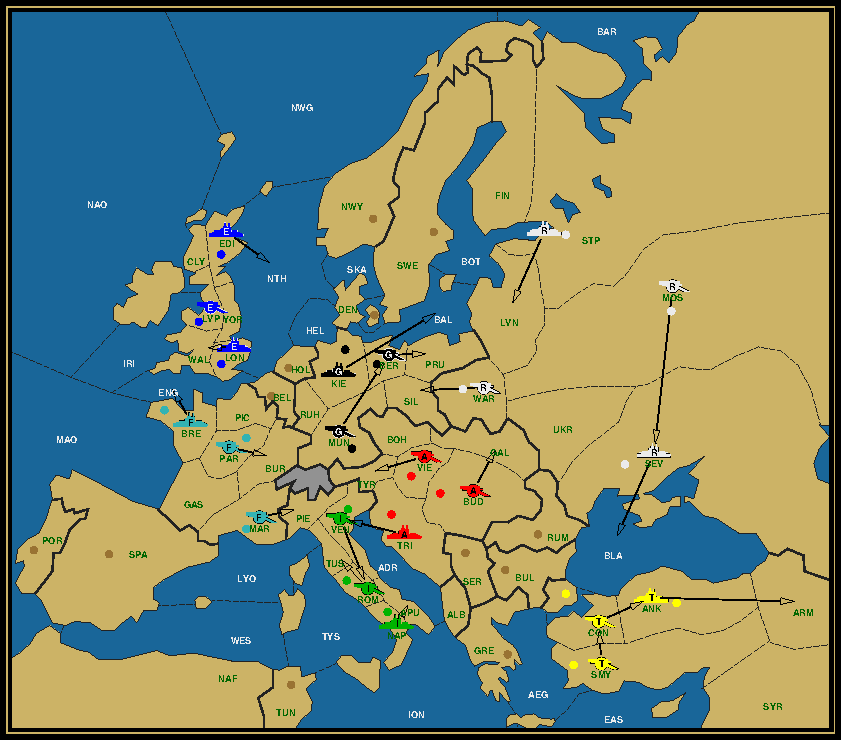
False Start S1901M, London variation
Click to enlarge in separate window
"Well, then," I said, "we deduced that two Italians will take a different route. The fleet moves into Ionian Sea, and the Venetian army to Trieste. That means that the Austrian fleet can no longer follow into Venice, but must move out of the way, either to Albania or the Adriatic. The Adriatic gives us more options, so let's move it there."
I paused for a moment before continuing: "For a dislodgement we need 3 units. Tuscany-Piedmont-Tyrolia is such a threesome, therefore Tyrolia can not be used to help the Austrian fleet dislodge the Vizier's army in Trieste. We need to pull back the second Austrian army from Galicia to Budapest or Vienna. But as Vienna is the Vizier's next destination, and retreating to where the attacker comes from is not allowed, it must hold in Budapest.
"It's now Berlin-Silesia that lacks a unit. Returning Berlin to Munich to link up with the French army gives us our sixth threesome."
I was simply applying the stratagem employed by Holmes to find 7 dislodgements in the first year, but the Prince seemed mightily impressed. He pointed to the two Turkish armies: "So these are the pieces that are going to give the Italian fleet a warm welcome. How will they do that?"
"How?" I asked baffled, seriously wondering if he even understood the basics of the Game.
"The Prince has a point," Holmes remarked. "How will those armies be able to dislodge the Italian fleet in the final Fall season if they're at the same time occupied with removing the Russian fleet?"
"Well, they can't, of course," I admitted. "They can only dispose of one, not two. Unless it's them attacking the Russian fleet in the first Fall season… But that will not help much, as neither the Russian fleet is allowed to retreat to Ankara, nor can the Turkish fleet capture Sevastopol. Because once captured it's impossible to recapture these ports and build a different fleet at the same time."
I had swapped the Turkish and Russian fleets to prove my point, but then the Prince remarked: "What about a convoy of the Russian army to Constantinople?"
I felt surprise. The kid did know the rules of the Game, I thought, as we went through the moves. The convoy of Sevastopol to Constantinople with the aid of the Turkish Black Sea fleet, while the two Turkish armies did away with the Russian fleet and the Italian fleet moved into the Aegean Sea; the removal of the Turkish fleet in Winter for the loss of a home center; the dislodgement and disband of the Russian army by the Italian fleet with support from one Turkish army; and the final dislodgement of that fleet by the two Turkish armies. It all worked out perfectly.
At this point Holmes came to my rescue, saying: "Let us not lose sight of the bigger picture. The action is moving away from Russia. If we follow through on the convoy, we end up with two useless Russian builds. Russia should instead move out. I believe it's better to move Moscow to the Ukraine instead."
I felt relief that the Prince was proven wrong, because I was not sure if I could handle two prodigies in the same room. The kid was clearly taking after his father.
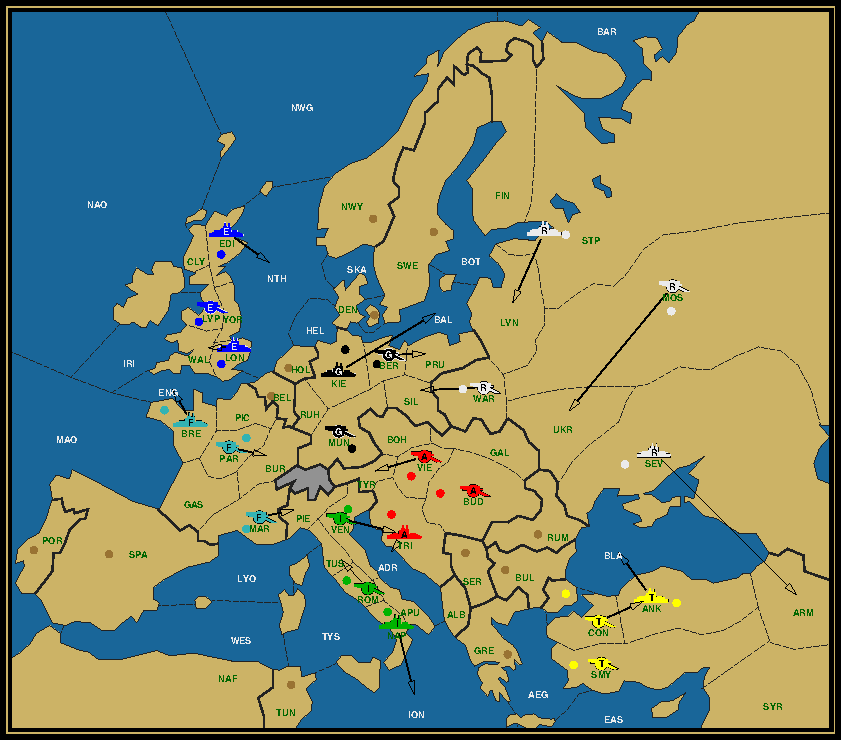
The Last Theorem of Suwat S1901M
Click to enlarge in separate window
With the Spring turn played out I moved quickly to the dislodgements in the Fall. Wales to the Channel with the support from North Sea and the retreat to London. Silesia to Munich with the support from Burgundy and the retreat to Berlin. Baltic Sea to Livonia with the support from Prussia and the retreat off the board of Russia's Northern fleet to allow it to be rebuilt. Likewise Ankara to Armenia with the support from Smyrna and the retreat off the board of Russia's Southern fleet. Then Tuscany to Piedmont with the support from Tyrolia and the retreat to Venice. And finally Budapest to Trieste with the support from Adriatic Sea and the retreat to Vienna.
Of the four units not involved in a dislodgement, Liverpool and Black Sea both held, while Ionian Sea moved on to the Aegean Sea. But what was I to make of the Russian army in the Ukraine? "Towards the action," Holmes had said. Well, the main action was in Austria, so hesitatingly I placed the Russian piece in Galicia.
"You see, I had not exaggerated in praising the qualities of Dr. Watson's game," beamed my companion. "There's just one thing that I don't like. The Russian army in Munich."
"That was the move played in the Portage Convoy problem," I said in defense.
"I know. To compensate for the loss of Sevastopol and allow for an important build. But in this case no Russian home center is lost. An extra build would put Russia in a similar situation as France, forced to keep units in every home center. That would complicate Russia's unconventional build pattern," he said with a wink.
I grinned at this and replaced the Russian army with the French army from Burgundy. I had to admit that this gave France, doubling in size, all the freedom to move its agents around without concern for its home centers.
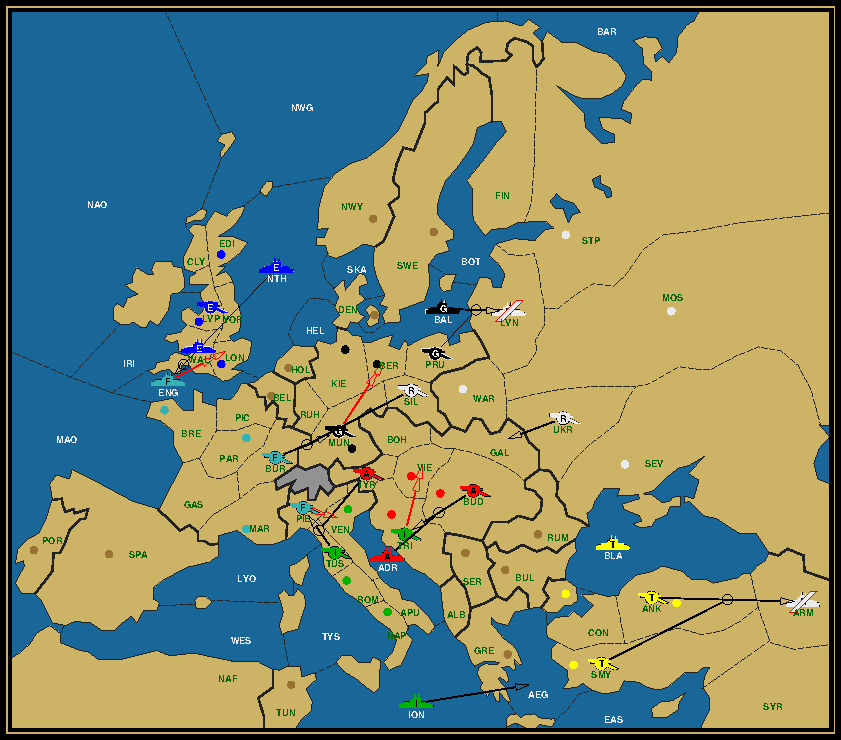
The Last Theorem of Suwat F1901M/R
Click to enlarge in separate window
"But I'm still not clear why we would need an army in Galicia," I said in all sincerity.
"Perhaps because of the loss of an Austrian home center?" offered the Prince.
"Quite so," said Holmes. "Disbanding one of the armies would leave Vienna surrounded by just one enemy unit for attacking our Italian Vizier. The Russian army provides the second one."
"And which army do we remove then?"
"The one in Tyrolia?" suggested the Prince. "That's where the Vizier will retreat to next."
This was the same reasoning I had used for not moving Budapest to Vienna in the first season. I removed the Tyrolian army, but not without silently berating myself. I then placed three new pieces in France, identical to those at the start, took out the English army and German fleet, rebuilt the Russian Sevastopol fleet and dropped a third Russian army in Moscow. I was satisfied to see a brief look of astonishment in the Prince's face, but he kept quiet.
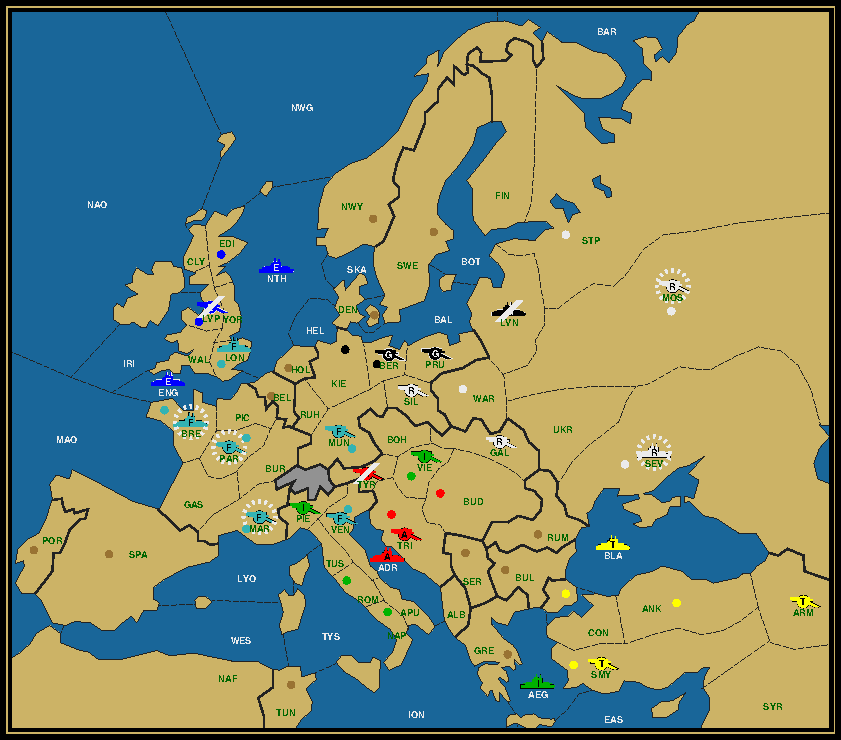
The Last Theorem of Suwat W1901A
Click to enlarge in separate window
"We're now entering the second year," I said ominously. "Whether the Last Theorem can be proven or not, we will know in a few moments."
It had to be said that the board looked pretty nice, with many pieces clustered together to encourage further dislodgements.
"First, England retakes London by pushing out the French fleet towards Wales from where she is in a position to attack and dislodge the fleet in the English Channel." I moved the North Sea fleet into London, indicating support from the English Channel, and retreated London to Wales, vividly remembering the moment years ago when my friend Holmes jumped out of his chair to dictate the telegram to the Sultan which would alter his life.
"Next, the Turkish fleet lands in Sevastopol supported by Armenia, dislodging the Russian fleet there. This fleet retreats to Rumania in order to set up a reverse attack in the Fall with the aid of the army in Moscow."
Executing the moves, it became clear now where the Italian fleet needed to go. "To make the Turkish armies trade places, Armenia must end up in Smyrna, so Smyrna must move out now to Constantinople to make room for the Italian fleet in the Aegean Sea.
"For the center of the board, we can have the Russian army in Galicia to attack Vienna with support from the Austrian army in Trieste, allowing the Vizier to retreat to Tyrolia. The French army in Munich can be dislodged by Silesia supported by Berlin, and retreat to Bohemia, while Prussia follows behind into Silesia. This sets up both Russian armies to be dislodged and destroyed in the Fall season, as the Germans take Munich and Austria regains Vienna aided by the French army in Bohemia."
Four dislodgements, and it didn't stop there. "Poor France gets also chased out of Venice when the Austrian fleet attacks its army supported by the Italian army in Piedmont. It cannot retreat to Rome, otherwise Italy would lose its capital, but either Tuscany or Apulia are adequate places to prepare for supporting the Italian army to recapture Venice."
"So Munich becomes German, Vienna becomes Austrian and Venice Italian," the Prince summed up. "This leaves Trieste. But the poem tells us that the author is not allowed into the city. How does that work?"
I had my answer ready. "He gets bounced out by the Austrian fleet in Venice. For a unit to be dislodged, it is not required to hold in that spot. It may attempt to move out and if that attempt bounces, it can still be dislodged from where it started. Moreover, the poem speaks of guards. This is the same fleet that started in Trieste, so you could say they are the guards of the city."
"But then the Vizier will simply remain in Tyrolia, will he not?" observed the Prince. "This is not then a solution to the False Start problem."
"Indeed," said Holmes. "There must be another way."
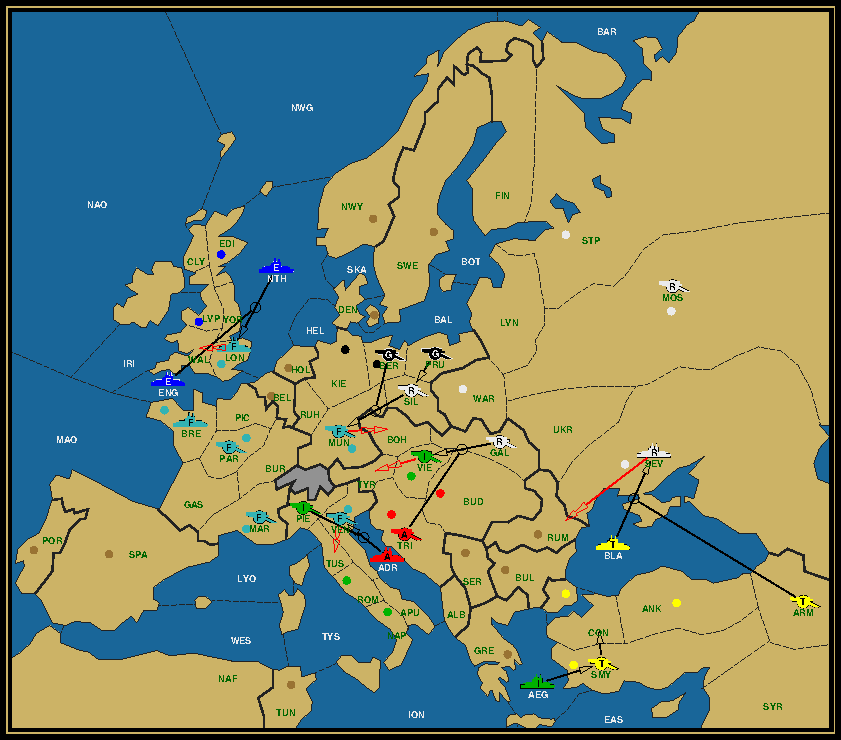
The Last Theorem of Suwat, Watson's S1902M/R
Click to enlarge in separate window
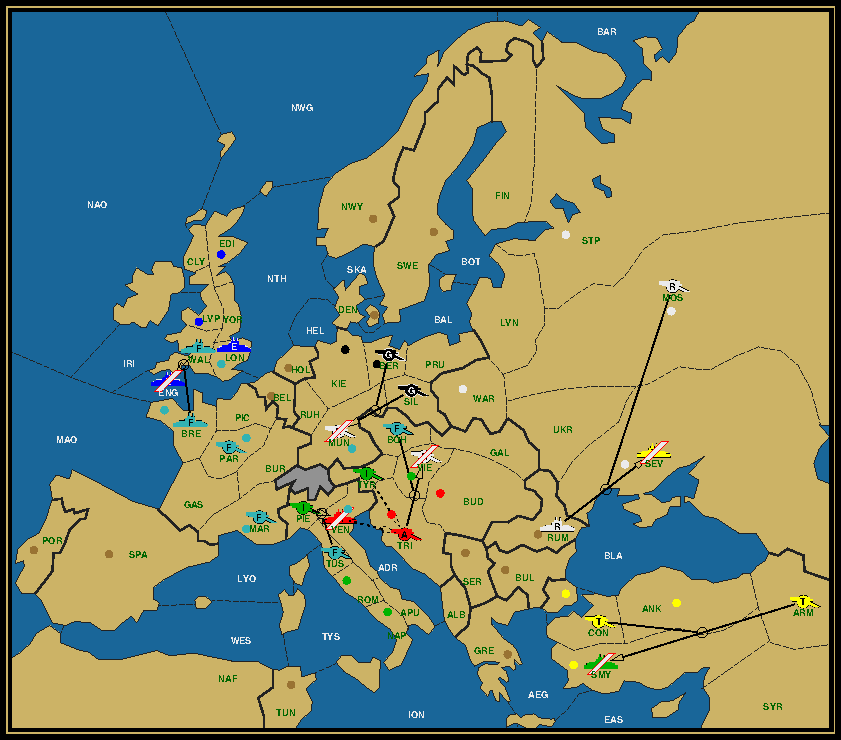
The Last Theorem of Suwat, Watson's F1902M/R
Click to enlarge in separate window
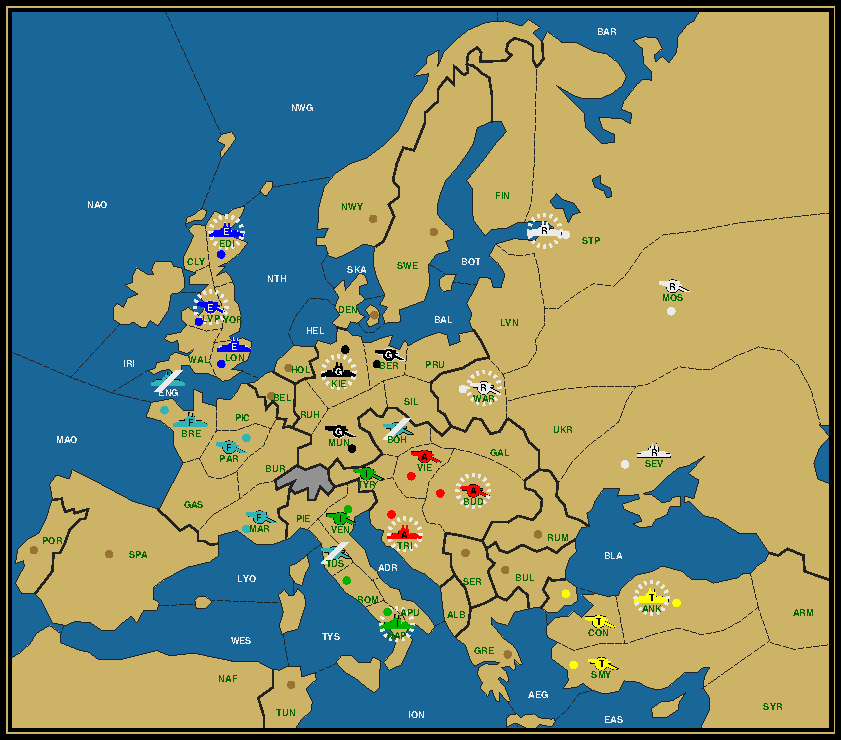
The Last Theorem of Suwat, Watson's W1902A
Click to enlarge in separate window
The three of us stared in earnest to the cluster of armies in the center of the board. Where did we go wrong? Or were our conclusions from analyzing the poem simply mistaken? Yet the case was compelling. The Italian fleet landing on the Turkish coast, the Venetian army constantly on the run, the climactic clash with the fleet from Trieste… But to count as a False Start problem, it was inconceivable that Italy, that had no surplus units like France, would keep an army in Tyrolia.
"Perhaps the army was disbanded after being dislodged from Vienna," I suggested.
"That would indeed provide a solution to the False Start problem, but it's not the one intended by the poem."
Finally the Prince spoke up: "Is it not so that the Russian army in Galicia is the one that started in Moscow?"
"Indeed it is," I said.
"In that case it can support Trieste to Vienna instead of the other way around." The Prince picked up the pieces himself and moved them around. "In Fall the Russian army moves on to Warsaw, while the Austrian army, already in its end destination, supports the French army from Bohemia to Tyrolia, dislodging the Vizier's army there."
"Exquisite," exclaimed Holmes. "This allows for the Vizier's army to hold and retreat, as it did before, but this time to Trieste where it's bounced out by the Austrian fleet retreating from Venice. A failed retreat results in both units being disbanded unconditionally, echoing the fatalistic tone of the poem."
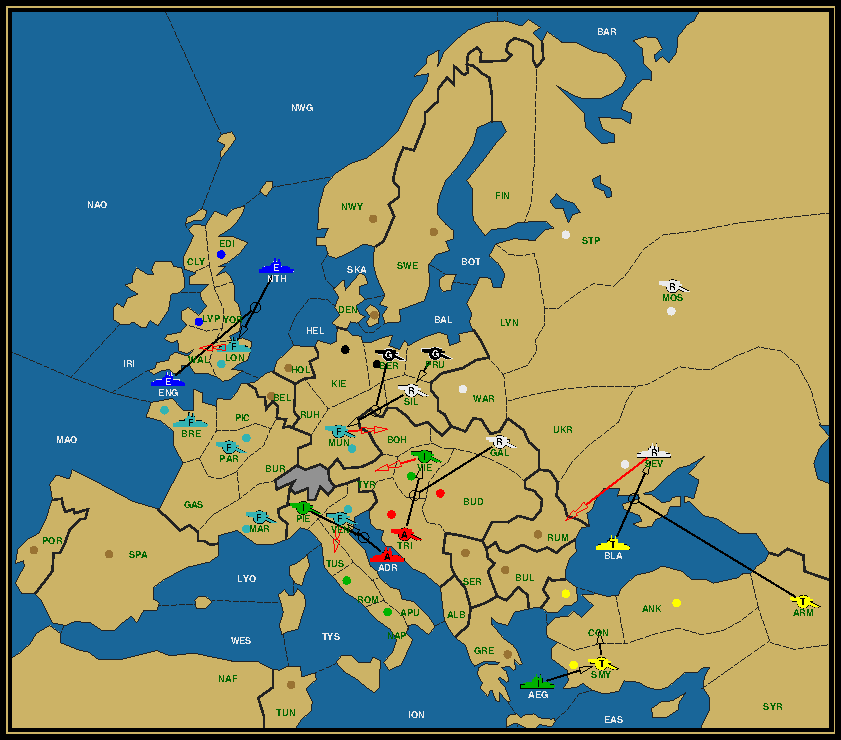
The Last Theorem of Suwat S1902M/R
Click to enlarge in separate window
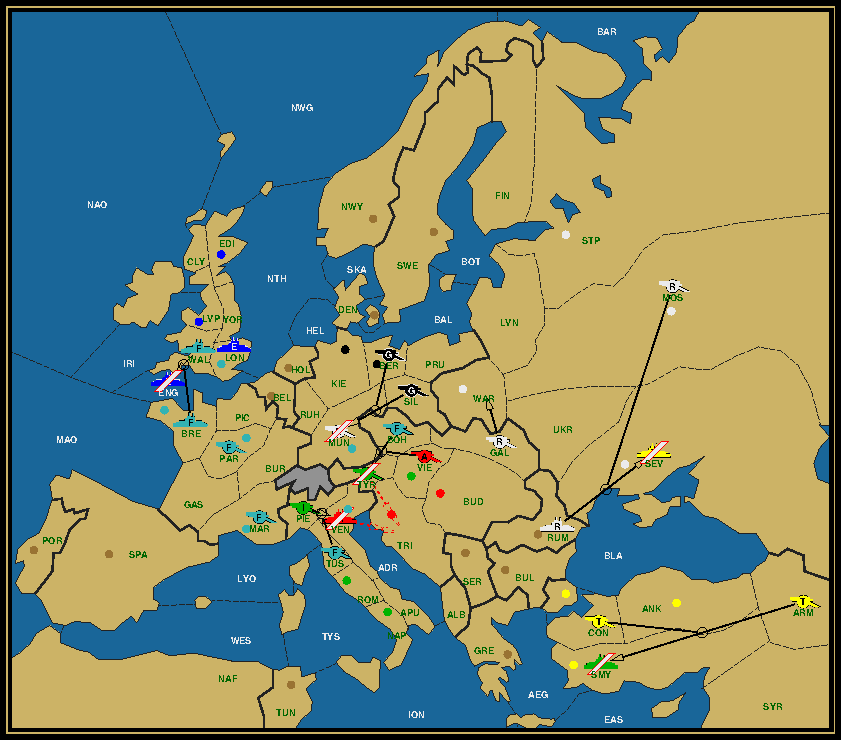
The Last Theorem of Suwat F1902M/R
Click to enlarge in separate window
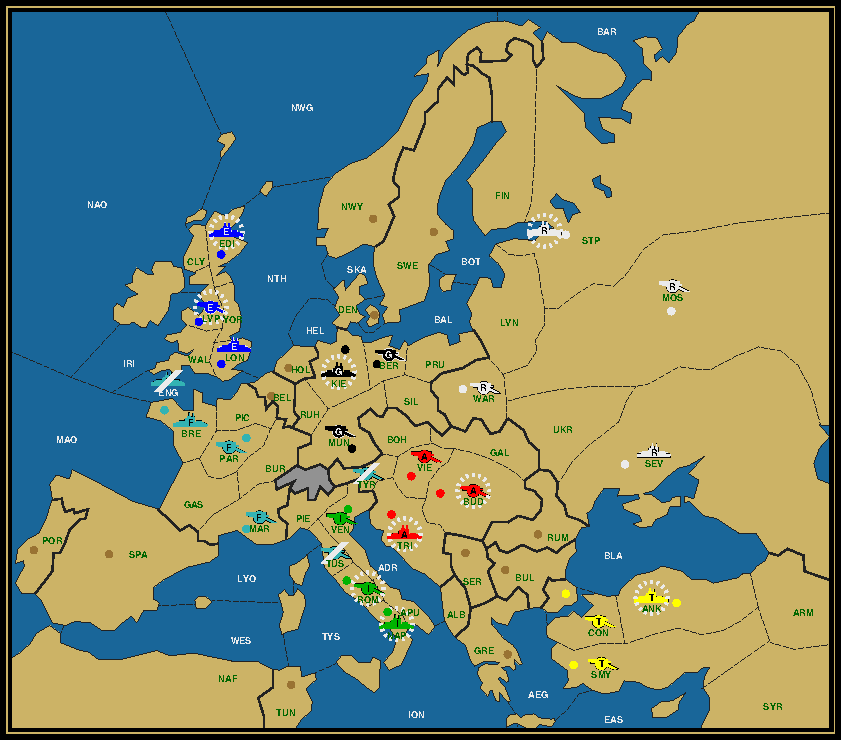
The Last Theorem of Suwat W1902A
Click to enlarge in separate window
Click here for the complete solution.
I had already calculated the dislodgements and felt it was time to announce the result. "Sires, unless I'm very much mistaken, we have a grand total of 17 dislodgements, two more than the original solution. The Sultan has therefore not only proven the Last Theorem, he has exceeded every expectation!"
A flurry of pride blushed the cheeks of the Sultan's son. But he had other worries to quell. "So then, where are the Keys? And what happened to the Vizier?"
Sherlock looked him straight in the eyes. "For that we need to answer the riddle hidden inside the poem. For it is a riddle in the truest sense of the word, in the same vain as the famous riddle of the Sphinx. A man is prohibited from entering the city. Yet what he came to deliver, the Keys, did get inside. How?"
The Prince shrugged at the question. "Because he has been in the city before and left them there?"
"Quite so," smiled Sherlock. "We see the army from Venice passing through Trieste and then with a wide loop come back to Trieste, turning in circles as the poem's opening and closing lines suggest. And who would he entrust the Keys to on his first visit?"
"My aunt! She took care of him. He trusts her. I must look her up at once."
"And no better person to know the whereabouts of the Vizier," added Holmes. "But be discreet, for she may shut up if you bring the police force with you."
"Indeed, Mr. Holmes, I will. Thank you so much for solving this mystery," said the Prince, shaking his hand vigorously. Then he turned to me and spoke: "And you, Dr. Watson, thank you for opening my eyes. Without you I would never have realized the attraction of the Game on the brightest minds and the common people alike."
And off he was like the wind. To a boat that would bring him to Trieste, the Imperial Port of the Austro-Hungarian Empire. And what he would find there, we would surely find out in the news.
Sherlock Holmes laid down the newspaper and heaved a sigh of relief. "All well that ends well," he said smiling. "He looks pretty stylish in that picture of the crowning ceremony, where he presents the Keys of the City to the representatives from the Ottoman court. His mother chose well."
"Of greater significance is that he has reconciled himself completely with the memory of his father," I commented. "He has instituted the day of his father's death as a Day for the Respect of the Elder. Moreover he is promoting the Game of Diplomacy through the establishment of an Academy and its elevation to a national sport. It's all too regretful that another man had to die for this to happen. The Vizier's actions were unconventional, but his goal was a noble one. His tragic death is therefore entirely undeserved."
"Judging from their faces, I think Lord Fortescue and Inpector Gregson can tell us a different story," replied my friend.
Lord Fortescue was calmly sipping from his tea. There was nothing of the excitedness of his previous visits. "The newspapers get to write what we tell them to," he said. "… on occasion. Inspector, if you could give the details. This information is classified, but Mr. Holmes and Dr. Watson are entitled to hear the truth, if not disseminate it until it's been made public through the official channels."
The Inspector cleared his throat with the brandy Holmes had offered him. "As reported in the papers, there was a gun fight just outside the city of Trieste involving the Austrian police force and the former Grand Vizier of Suwat and his escort. One of the constables was hospitalized when he was shot off his horse. The Vizier was reportedly hit before his men were able to make a clean escape.
"We had picked up his scent again when the Crown Prince, just three days before his coronation, entered our branch office in Trieste in person and proposed the following deal: Full disclosure of the Vizier's whereabouts in return for corroborating his death. The wounded constable, who was already recovering, would receive a royal compensation. As he, the official representative of the State of Suwat, had dropped all charges against the Vizier, we had no case anyway and so we agreed to cooperate."
"Have you been able to confirm that the old Sultan's death was a natural one?" Holmes enquired.
"Yes, we did. The court physician who was there when he died, has testified that his Master was terminally ill. This was kept a secret for the public in order to prepare for his succession in quietness. The Sultan seemed to have had some doubts about his son's capabilities."
"The feeling was mutual. And what about the Vizier himself?"
"The Vizier had been shot in the chest, but has miraculously survived, and is in the care of the Prince's aunt. Out of gratitude he has allowed himself to be baptized to marry her. He has expressed the desire to be removed from the public eye so that he could devote the rest of his life to her and to God. To avoid a scandal in his own country the Prince has granted him this extraordinary request. Everything he had taken with him, including the Keys of the City, had been given to the Force for further scrutiny."
"We have of course immediately turned over the Keys to the Prince to enable his coronation," continued Lord Fortescue. "One of the first acts as the new Sultan of Suwat was to grant the British Empire a 25 year lease on the port facilities of Suwat. Well, Holmes, your services may no longer be needed, but we'd still like to thank you for your various services over the years. Inspector?"
Inspector Gregson took a rolled up paper of the finest quality out of his briefcase, and unrolled it, revealing the royal seal below a letter of recognition written in the finest calligraphy and addressed to my best friend. Lord Fortescue read it out in his most solemn voice, before handing it over and shaking hands with the great detective.
After they left, Sherlock looked at me and said dryly: "You see, Watson, at the end of the third act the Prince redeemed himself and was rewarded with the Sultan's throne. But what do we get? A framed letter to put on the mantelpiece and an invitation to the King's ball. No wonder that the English Opera never takes off the ground."
If you wish to e-mail feedback on this article to the author, and clicking
on the envelope above does not work for you, feel free to use the "Dear
DP..." mail interface.
| 




